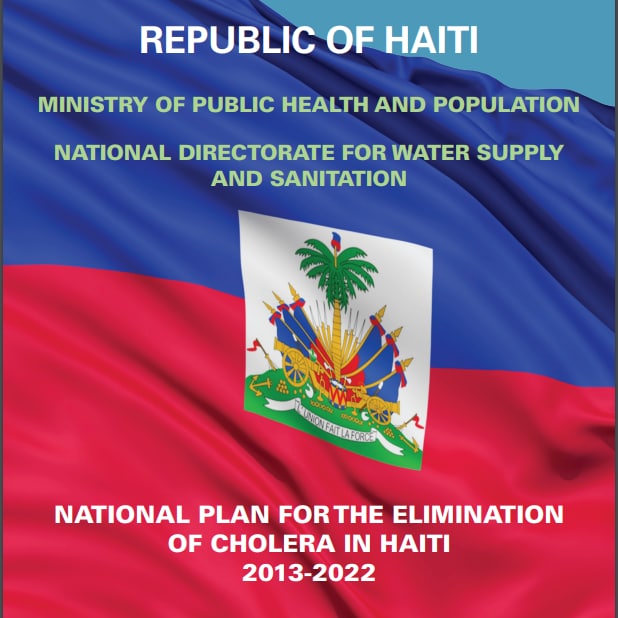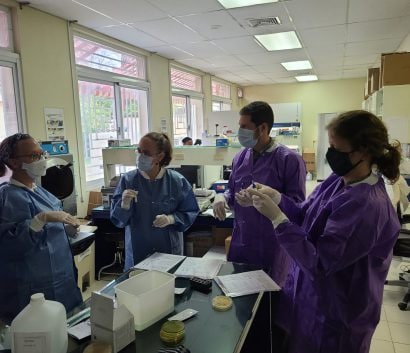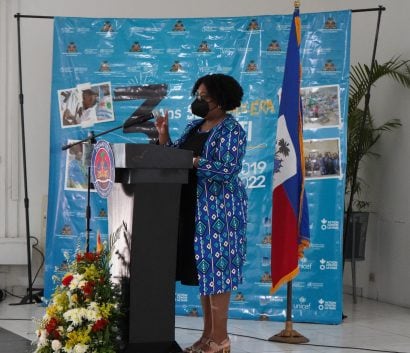Improving Water, Sanitation and Hygiene in Haiti: Past, Present, and Future
In 2022, Haiti celebrated it had zero confirmed cholera cases for the past three years. However, Haiti still has the lowest coverage rates and access to clean water and sanitation infrastructure in the Americas. The U.S. Centers for Disease Control and Prevention (CDC) works with domestic and international organizations to improve Haiti’s water, sanitation, and hygiene (WASH) conditions and infrastructures. Strategies for increasing access to safe drinking water and improved sanitation facilities have been challenged by natural disasters, exacerbating the spread of water-borne illnesses. CDC and partners committed significant aid to improve health, infrastructure, and WASH conditions. Water quality, low sanitation coverage, and inadequate access to drinking water highlight the need for continued work in Haiti. Below a historical snapshot of water-related events, impact of those events, CDC WASH response activities, and milestones in Haiti over the last 12 years.
- Timelineicon
2010
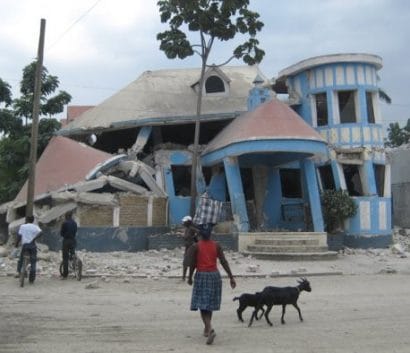
Photo: Thomas Handzel/CDC
- January 12 – 7.0 magnitude earthquake hit Haiti. The Haitian government estimated that 230,000 people died and 300,000 were injured.
- CDC experts deployed to Haiti to train health officials on rapid tests for dengue, malaria, and cholera (a waterborne disease), ensure outbreak preparedness, and increase lab capacity.
- Haiti sent a picture of the first cholera Rapid Diagnostic Test (RDT) result to CDC. CDC received samples and confirmed the first clinical cases of Vibrio cholerae infection in Haiti in >100 years.
- Timelineicon
2011
- CDC Haiti worked with the Haiti Ministry of Public Health and Population (MSPP) to build the National Cholera Surveillance System (NCSS). This platform produces daily reports from cholera treatment facilities of new and hospitalized cases and deaths aggregated by age groups.
- Timelineicon
2012
- Following 2011 Cholera outbreak, CDC launched an epidemiological study to assess household water treatment and storage uptake intervention including water quality testing of major water sources used by rural and urban households in Artibonite Department, in north-central Haiti.
- Timelineicon
2013
Source: PAHO
- MSPP in collaboration with partners launched the National Plan of Action for the Elimination of Cholera in Haiti 2013–2022.
- CDC and National Directorate of Water and Sanitation (DINEPA) trained and deployed over 200 local rural water and sanitation technicians (TEPACs) who provide routine and emergency WASH support in all 133 communes in Haiti. This new workforce inventoried all 500 rural piped water systems in Haiti ensuring increased access to drinking water.
- Timelineicon
2014
- CDC designed, implemented, and supported Oral Cholera Vaccine campaign in Haiti, that targeted almost 200,000 individuals.
- Timelineicon
2016
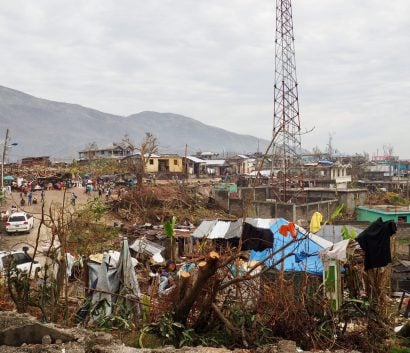
Photo: CDC Enteric Diseases Laboratory Branch
- Access to improved drinking water sources increased to 59% in 2016 from 43% in 2012 in rural areas.
- October 4 – Hurricane Matthew (Category 4), hit and greatly damaged Haiti.
- TEPACs assessed damage to community water systems, identified needs and facilitated hurricane response activities that helped prevent the spread of water-borne disease.
- CDC sent experts from Atlanta to Haiti and worked with USAID Disaster Assistance Response Team for Hurricane Matthew response.
- Timelineicon
2017
- Hurricanes Irma and Maria hit Haiti causing significant damage.
- Having managed the Hurricane Matthew response, CDC Haiti country office, and experts in CDC Atlanta identified a plan early for the domestic and international hurricane response that resulted in CDC’s Emergency Operations Center activating the International Task Force (ITF).
- Timelineicon
2019
- Cholera transmission declined from 352,000 suspected cases in 2011 to just 720 in 2019. The last laboratory-confirmed cholera case was in February 2019.
- CDC’s Epidemic Intelligence Service Officers visited Haiti for evaluation of cholera surveillance system as cases decline and cholera treatment centers stand down.
- Timelineicon
2021
Photo: Amber Dismer/CDC
- CDC helped install toilets in 500 households by the spring of 2021, resulting in an increase of 3,000 more people with access to household sanitation.
- August 14 – 7.2 magnitude earthquake struck Haiti killing more than 2,240 and injuring approximately 12,700. CDC immediately activated an Incident Management System, to coordinate an emergency response.
- CDC post-earthquake response and recovery WASH activities:
- Rehabilitated WASH infrastructure in health facilities and assembly points serving displaced persons.
- Strengthened laboratory systems to support cholera surveillance. Worked with CDC Haiti and the MSPP to train nurses at the National Laboratory of Public Health to deliver RDTs in assembly points and detect potential cholera cases.
- Worked with DINEPA to ensure access to treated water by monitoring levels of free chlorine residual in municipal water systems and water trucking filling stations.
- Worked with CDC Foundation to allocate funding from Bill and Melinda Gates Foundation to support COVID-19 vaccination and WASH activities. In addition, provided infection prevention and control supplies and replaced surveillance equipment damaged by the earthquake.
- Timelineicon
2022
Photo: Mario Silney/CDC Haiti
- Third anniversary of the last confirmed cholera case in Haiti. MSPP and DINEPA recognized contributions of partners, including CDC.
- CDC conducted virtual training for a tool that links case investigation data with laboratory sample confirmation data at a case level for acute water diarrhea surveillance.
- CDC deployed experts to Haiti to provide support the implementation of a new cholera test to help detect cholera cases nationwide.
